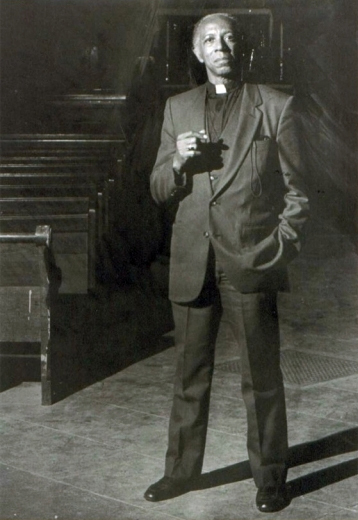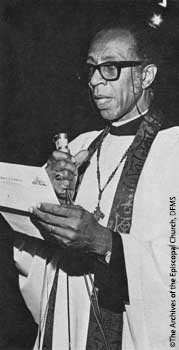Leadership Gallery
The Reverend Paul Washington, 1921-2002
Those who are cowards will ask, 'Is it safe?'
Those who are political will ask, 'Is it expedient?'
Those who are vain will ask, 'Is it popular?'
But those who have a conscience will ask, 'Is it right?'
- Paul Washington
Paul Washington rose to national prominence as an unflagging activist in the cause of civil and women's rights. One of the few Black priests in a traditionally white church, he fought for tolerance and respect among all people, eventually serving twenty-five years as the Rector of the Church of the Advocate in an inner-city Philadelphia neighborhood. His non-traditional views on equality often met with resistance from church leadership. In spite of this, he rejected threats of withdrawn funding or retaliation to follow his heart and his theology.
Born in Charleston, S.C. into a Baptist family, he later graduated from Lincoln University and Philadelphia Divinity School. Upon completion of his pastoral work at the Church of the Crucifixion in South Philadelphia, Washington married his wife Christine. They moved to Liberia as missionaries in 1948. During his six years in Liberia, Washington helped found Cuttington College, which educated many African leaders. Returning to Philadelphia, he was made rector at the Church of the Advocate in 1962 where he served his twenty-five year ministry.
As a supporter of the Black Power movement and the Black Panthers, he provided his church as a meeting place for these and other groups working towards equality and justice. The Church of the Advocate hosted the Black Power Convention in 1968, a gathering that drew the leading Black activists of the time. In 1970 he opened the doors of his church to the National Convention of the Black Panther Party, courting much criticism. Washington became accustomed to the criticism he received for his controversial beliefs, including his demand that Episcopalians pay reparations to the descendants of African American slaves. From 1964 to 1971, he served on Philadelphia’s Human Relations Commission.
Father Washington discusses the dehumanization experienced by the black community, and the importance and power of community organization, 1968.
Paul Washington greeting those assembled for the ordination of the first women priests at the Church of the Advocate, 1974.
His church became a beacon of liberation for those Washington referred to as the “other sheep”: the poor, the dispossessed, the oppressed, women, and black and gay people. In 1974 The Advocate hosted the ordination of the “Philadelphia 11" – the first women ordained in the Episcopal Church. This action galvanized the Church to confront the issue, ultimately allowing women into the priesthood in 1977.
While at the Church of the Advocate, he also served as Episcopal Chaplin at Eastern State Penitentiary and on the MOVE Commission, a radical “back to nature group” group following the teachings of the self-styled John Africa. Washington was the chaplain of the Advocate Communities Development Corporation’s (ACDC) Board of Directors and continued to serve ACDC until the fall of 1998. Established by his wife, ACDC continues to provide low and moderate-income housing to the members of the North Philadelphia community.
Washington's insight into the struggles for justice and dignity in the latter half of the twentieth century is documented in his autobiography Other Sheep I Have.
Paul Washington's personal papers are located at The Archives of the Episcopal Church. [Sources]



